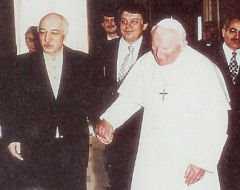
By Appo Jabarian
USA Armenian Life Magazine
March 24, 2010
In early March, the political wrangling between the righteous and
corrupt politicians in Washington before, during and after the voting
by the House Foreign affairs committee sparked a series of articles
critical of genocide-denying corrupt U.S. politicians both in the
House and the White House.
In a 12 March article in Huffington Post, Stephen Zunes wrote that
failure to acknowledge the genocide “is a tragic affront to the
rapidly dwindling number of genocide survivors as well as their
descendents. It’s also a disservice to the many Turks who opposed
the Ottoman Empire’s policies and tried to stop the genocide, as
well as the growing number of Turks today who face imprisonment by
their U.S.-backed regime for daring to publicly concede the crimes
of their forebears. For example, Orhan Pamuk, the Turkish novelist
who … was prosecuted and fled into exile to escape death threats
after making a number of public references to the genocide.
“Some opponents of the resolution argue that it is pointless for
Congress to pass resolutions regarding historical events.
Yet there were no such complaints regarding resolutions commemorating
the Holocaust, nor are there normally complaints regarding the
scores of dedicatory resolutions passed by Congress in recent years,”
added Zunes.
Opponents of the resolution also falsely argue that its passage by the
Congress can harm the U.S.-Turkey relations. “The United States has
done much greater harm in its relations with Turkey through policies
far more significant than a symbolic resolution acknowledging a
tragic historical period. The United States clandestinely backed
an attempted military coup by right-wing Turkish officers in 2003,
arming Iraqi and Iranian Kurds with close ties to Kurdish rebels in
Turkey who have been responsible for the deaths of thousands of Turkish
citizens. The United States also invaded neighboring Iraq. As a result,
the percentage of Turks who view the United States positively declined
from 52 percent to only 9 percent,” asserted Zunes.
The Obama administration, also controlled by the neo-cons, insists that
“this is a bad time to upset the Turkish government.
However, it was also considered a ‘bad time’ to pass the resolution
back in 2007, on the grounds that it not jeopardize U.S. access to
Turkish bases as part of efforts to support the counter-insurgency
war by U.S. occupation forces in Iraq. It was also considered a ‘bad
time’ when a similar resolution was put forward in 2000 because the
United States was using its bases in Turkey to patrol the ‘no fly
zones’ in northern Iraq. And it was also considered a ‘bad time’
in 1985 and 1987, when similar resolutions were put forward because
U.S. bases in Turkey were considered important listening posts for
monitoring the Soviet Union during the Cold War. For deniers of the
Armenian genocide, it’s always a ‘bad time,’” he pointed out.
In 1981, at a time when the neo-cons failed to control the White
House, President Ronald Reagan brushed off strong diplomatic protests
from Turkey and used the term genocide in relation to Armenians,
yet U.S.-Turkish relations did not suffer.
How come U.S. acknowledgement of the Jewish Holocaust does NOT upset
the German government, which also hosts critical U.S. bases?
“Obama is sending a message to future tyrants that they can commit
genocide without acknowledgement by the world’s most powerful
country.” In 1994, the Clinton administration “refused to use the word
‘genocide’ in the midst of the Rwandan government’s massacres of over
half that country’s Tutsi population, a decision that contributed to
the delay in deploying international peacekeeping forces until after
the slaughter of 800,000 people. … The Obama administration’
s
position on the Armenian genocide isn’t simply about whether to
commemorate a tragedy that took place 95 years ago. It’s about where
we stand as a nation in facing up to the most horrible of crimes,”
confronted Zunes.
In a March 16 HuffingtonPost.com article, titled “Why the Armenian
Genocide Matters,”, Writer of words and music, rider of waves, world
traveler Robbie Gennet wrote: “You may ask yourself why the Armenian
genocide currently matters, or more accurately, why Turkey is so
resolute against it being recognized as such. One would think after
almost a hundred years, an official apology for killing or displacing
2 million Armenians would be a welcome and long overdue occasion for
Turkey to make peace with Armenia. … Germany has made great steps to
publicly acknowledge and profusely apologize for the Jewish Holocaust,
even paying reparations, making holocaust denial and the display of
symbols of Nazism a criminal offense and establishing a National
Holocaust Memorial Museum in Berlin. But Turkey? They won’t even
allow the US to label the Armenian genocide as such or acknowledge
it in any way. Here is why: land.”
She outlined: “Take a look at a map of pre-genocide Armenia here, here
and here. What you will notice is that a huge chunk of what is now
Turkey was then considered Armenia. If the 1915 Turkish actions were
indeed recognized as a genocide, current day Armenia could potentially
petition for the return of its land. Note that this may even include
the area known as Cilicia, a separate but ethnically connected entity
bordering the Mediterranean Sea that dates back to the Kingdom of
Cilician Armenia in the early part of the second Millenium. These
historically grounded lands could rightfully be considered Armenian if
they could establish that they were unlawfully taken from them via the
genocide. The evidence is there and so is the history. Armenia itself
was officially named way back in 512 BC when it was annexed to Persia,
while Cilicia was established as a principality it 1078. After years
of struggle under Turkish, Kurdish and Mongol rule, the Ottoman Empire
ruled Armenia from 1453-1829, after which the Russian Empire ruled
through the rest of the 19th century. After the Genocide and WWI,
what’s left of Armenia was annexed by Bolshevist Russia and became
part of the Soviet Union from 1922-1991, after which Armenia declared
its independence. But let’s back up for a moment for a glimpse at
what happened during WWI”.
She revealed: “In 1913, three so-called Young Turks took over the
Turkish government via a coup with a goal of uniting all of the
Turkic peoples in the region and creating a new Turkish empire called
Turan with one language and one religion. They wanted to expand their
borders eastward but standing in their way was historic Armenia. Hence,
the Armenian Genocide.”
Gennet asserted: “Judging from Turkey’s recalcitrance to discuss or
acknowledge it, that stain may never go away. But that doesn’t mean
it will ever be forgotten, no matter how much Turkey wishes it would
fade into history. Though they would like to take advantage of the
world’s collective amnesia, the internet has made it impossible to
forget and erase” the facts of the genocide by Turkey. In answer to
Adolph Hitler’s infamous quote, “Who still talks nowadays about the
Armenians?” she rebutted: “We all do, Mr. Hitler, and long after your
genocidal dreams have faded, long after the last survivors of those
inflicted generations have passed, they will not be forgotten.”
Turkish writer Lale Kemal interestingly wrote in Today’s Zaman:
“Turkey has currently been paying the price of sweeping under the
carpet its chronic and historic problems, such as the events of 1915,
in which, it is claimed, over 1 million Armenians were subjected
to a genocide campaign under the rule of the Ottoman Empire, the
predecessor to modern Turkey. … The Armenian Diaspora has moved
tobring this topic to the agenda of the Spanish Parliament after the
regional Catalonian Parliament passed a bill recognizing the events
as Armenian genocide. … The adoption of the genocide resolution
by the Committee on Foreign Affairs has already set an encouraging
example for Sweden to be followed by Britain.”
Speaking of the Turkish-occupied Armenian lands, Kemal wrote: “But
Ankara believes that adoption of such a resolution by the full US House
would have a snowball effect, raising the danger that Armenians will
initiate legal measures seeking land and compensation from Ankara.”
“While awareness of anti-Semitism is fortunately widespread enough
to marginalize those who refuse to acknowledge the Holocaust,
tolerance for anti-Armenian bigotry appears strong enough that it’s
still considered politically acceptable to deny their genocide,”
lamented Zunes.
The U.S. congressional mid-term elections in November is the number
one source for pre-occupation among the incumbent congressional
candidates in battle-ground districts and states.
Armenian Americans and their friends across the nation should move to
politically punish the deniers. Denial of the crime of any genocide –
from Turkish-occupied Western Armenia and Cilicia to Darfur, should
be made politically unaffordable. The neo-cons and their lackeys do
not understand the language of morality. But they readily comprehend
the language of deterrence.











